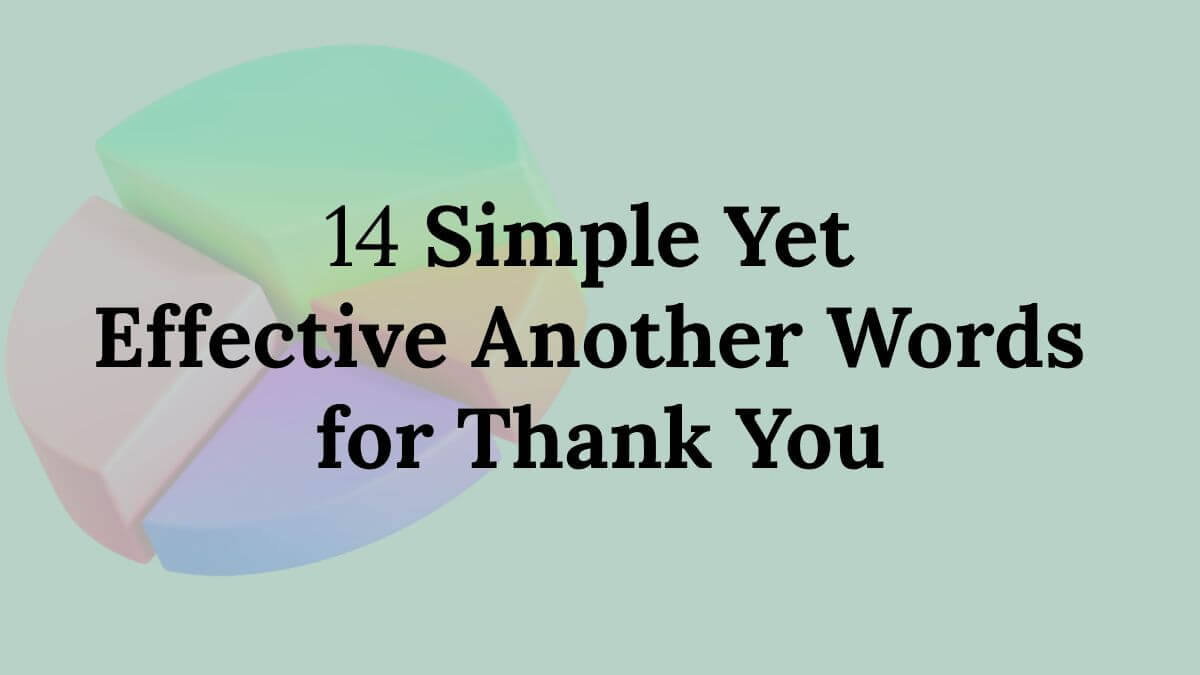Discover 14 simple yet effective another words for thank you to enhance your English communication.
Expressing gratitude is an essential part of communication in English. While the phrase thank you is widely used and understood, knowing another words for thank you can make your conversations richer, more sincere, and more engaging. Whether you’re an English learner or educator, having a variety of ways to say thank you not only enhances your vocabulary but also helps you sound more natural and polite.
By mastering another words for thank you, you’ll be able to express appreciation in different situations with ease and confidence.
In this blog post, you will discover 14 simple yet effective alternatives to thank you. These options can be used in different contexts, from casual conversations to formal writing. Mastering these phrases will boost your confidence and improve your overall English communication skills.
Why Knowing Another Words for Thank You Matters
Learning another words for thank you is more than just memorizing synonyms. It’s about enriching your ability to express gratitude in ways that feel natural, sincere, and appropriate to different situations. When you rely on the same phrase repeatedly, such as thank you, your speech or writing can become monotonous or even seem less genuine. By expanding your vocabulary with another words for thank you, you make your communication more engaging and effective. Using a variety of another words for thank you helps you connect better with others and express your feelings more personally.
Here are some key reasons why mastering different ways to say thank you is important:
1. Sound More Genuine and Heartfelt
Using different expressions allows you to tailor your thanks based on how grateful you truly feel. Saying I really appreciate it or I can’t thank you enough can convey a deeper level of gratitude than just a plain thank you. This makes your message feel more meaningful and personalized.
2. Adapt Your Language to Different Social Settings
Every situation calls for a different tone. Informal phrases like thanks a bunch are great for friends and family, while more formal alternatives such as thank you kindly or many thanks fit professional or written communication better. Knowing multiple ways to say thank you lets you choose the most appropriate phrase for your audience.
3. Avoid Repetition in Your Writing and Speech
Whether you’re writing an email, a thank-you note, or simply chatting, repeating thank you too often can make your language dull. Variety adds spice! Using synonyms keeps your conversations fresh and your writing dynamic, which is especially important for educators, writers, and learners who want to improve fluency.
4. Enhance Your English Vocabulary Naturally
Learning another words for thank you isn’t just about gratitude-it’s also a great opportunity to build your overall vocabulary. Many of these expressions come with subtle differences in tone and formality, helping you understand the nuances of English communication. This will improve both your speaking and writing skills.
5. Build Confidence in English Communication
When you know more ways to express yourself, you feel more confident in conversations. Being able to respond appropriately in different contexts-whether casual, formal, or professional-makes your English more polished and impressive.
Practical Tip:
Try to practice using these alternative phrases in your daily conversations or writing. For example, instead of saying thank you every time, challenge yourself to use I appreciate it or many thanks depending on the situation. This small change will gradually help you remember and feel comfortable using these expressions naturally.
Why Knowing Another Words for Thank You Matters
Expressing gratitude is one of the most important social skills in any language. While saying the simple phrase thank you is common and widely understood, knowing another words for thank you can take your communication to the next level. It helps you connect better with people, sound more natural, and avoid repetitive language.
Here’s why expanding your ways to say thank you truly matters:
1. Makes Your Gratitude Sound More Genuine
When you use the same phrase repeatedly, like thank you, it can start to feel automatic or less heartfelt. Using another words for thank you, such as I really appreciate it or Thanks a bunch, lets you express your feelings in a way that feels more sincere and personal. This is especially important when you want to show deep appreciation. By learning another words for thank you, you make your gratitude sound more genuine and meaningful.
2. Fits Different Social Situations
English is a versatile language with many ways to communicate depending on the formality of the situation. Saying Cheers might be perfect with close friends, but in a formal email, many thanks would be more appropriate. Knowing another words for thank you means you can adjust your tone to suit casual chats, professional emails, or formal letters. Using another words for thank you helps you express gratitude clearly and fittingly in any setting.
3.Avoids Repetition and Keeps Conversations Interesting
Whether you’re writing a letter, sending an email, or just chatting, repeating thank you over and over can make your language sound dull. Using synonyms not only spices up your language but also shows your skill and knowledge of English. This is useful for both learners who want to improve and educators who want to teach varied vocabulary.
4.Builds Your English Vocabulary Naturally
Learning different ways to say thank you helps you grow your vocabulary with words and phrases that have slightly different meanings and uses. For example, I’m grateful sounds more formal than Thanks a lot, which is casual. Understanding these nuances improves your overall English fluency and helps you express yourself clearly.
5. Boosts Confidence in Communication
The more tools you have in your language toolbox, the more confidently you can communicate. Being able to choose the perfect thank-you phrase for any situation makes your conversations and writing sound polished and professional.
By understanding and using other words for thank you, you not only make your English sound more natural but also show respect and thoughtfulness to the person you’re addressing. This skill is valuable for everyday conversations, academic settings, and professional environments.
Ready to explore these alternatives? Let’s dive into 14 simple yet effective ways to say thank you that you can start using today!
Read More:
14 Simple Yet Effective Another Words for Thank You
1Thanks
This is a casual and friendly way to express gratitude. Use it with friends, family, or informal settings.
Example:
Thanks for helping me with my homework!
2. Thank You So Much
Adding so much emphasizes your gratitude and makes it sound warmer.
Example:
Thank you so much for the lovely gift.
3. Many Thanks
This phrase is slightly more formal and is often used in emails or written communication.
Example:
Many thanks for your prompt response.
4. Thanks a Lot
Similar to thank you so much, but more informal and conversational.
Example:
Thanks a lot for the ride!
5. I Really Appreciate It
This phrase expresses a deeper level of gratitude, showing that you truly value the action.
Example:
I really appreciate your help with the project.
6. I’m Grateful
A more formal expression that can be used in both spoken and written English.
Example:
I’m grateful for the support you provided.
7. Thanks a Bunch
A friendly and informal phrase often used in casual conversations.
Example:
Thanks a bunch for lending me your book.
8. Cheers
Commonly used in British English, cheers can mean thanks in informal situations.
Example:
Cheers for the info!
9. Much Obliged
An old-fashioned, polite phrase often used in formal or written English.
Example:
Much obliged for your assistance.
10. I Can’t Thank You Enough
Use this to express extreme gratitude when someone has done something very special for you.
Example:
I can’t thank you enough for all your support during this difficult time.
11. Thanks for Everything
A warm and comprehensive way to thank someone for multiple acts of kindness or help.
Example:
Thanks for everything you’ve done for me.
12. I Appreciate It
Short, simple, and polite, this phrase can be used in many contexts.
Example:
I appreciate it when you take the time to listen.
13. Thank You Kindly
A polite and slightly formal way to say thank you, often used in letters.
Example:
Thank you kindly for your attention to this matter.
14. Many Thanks in Advance
Used when you want to thank someone before they have done a favor or task.
Example:
Many thanks in advance for your cooperation.
How to Choose the Right Alternative
Formal vs. Informal
Use thanks, cheers, thanks a bunch in informal settings with friends or peers.
Use many thanks, I’m grateful, thank you kindly in formal emails, letters, or professional conversations.
Written vs. Spoken English
Written communication benefits from phrases like many thanks, much obliged, thank you kindly.
Spoken English often favors casual expressions like thanks, thanks a lot, I really appreciate it.
Context Matters
For deep gratitude, use I can’t thank you enough or I’m grateful.
For simple, everyday thanks, stick with thanks or thank you so much.
Examples in Real-Life Situations
In the Classroom
Many thanks for submitting your assignments on time.
I really appreciate your participation in class discussions.
At Work
Thank you kindly for your assistance with the report.
Thanks a lot for covering my shift.
With Friends and Family
Thanks a bunch for coming to my party!
Cheers for helping me move last weekend.
Conclusion
Mastering Another Words for Thank You enriches your English vocabulary and helps you communicate gratitude more effectively. Using these alternatives will not only prevent your language from becoming repetitive but also allow you to express your feelings in a more personalized way. Remember, choosing the right phrase depends on the situation, the level of formality, and the depth of your gratitude.
Keep practicing these phrases, and you’ll find your English conversations and writing becoming more natural and engaging. So next time you want to express thanks, try one of these 14 simple yet effective Another Words for Thank You and watch your communication skills grow!
Exploring Another Words for Thank You can transform your way of expressing gratitude, making your English more fluent and heartfelt.

